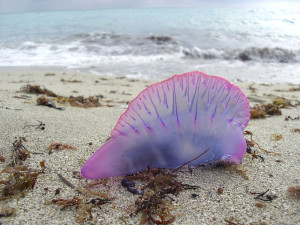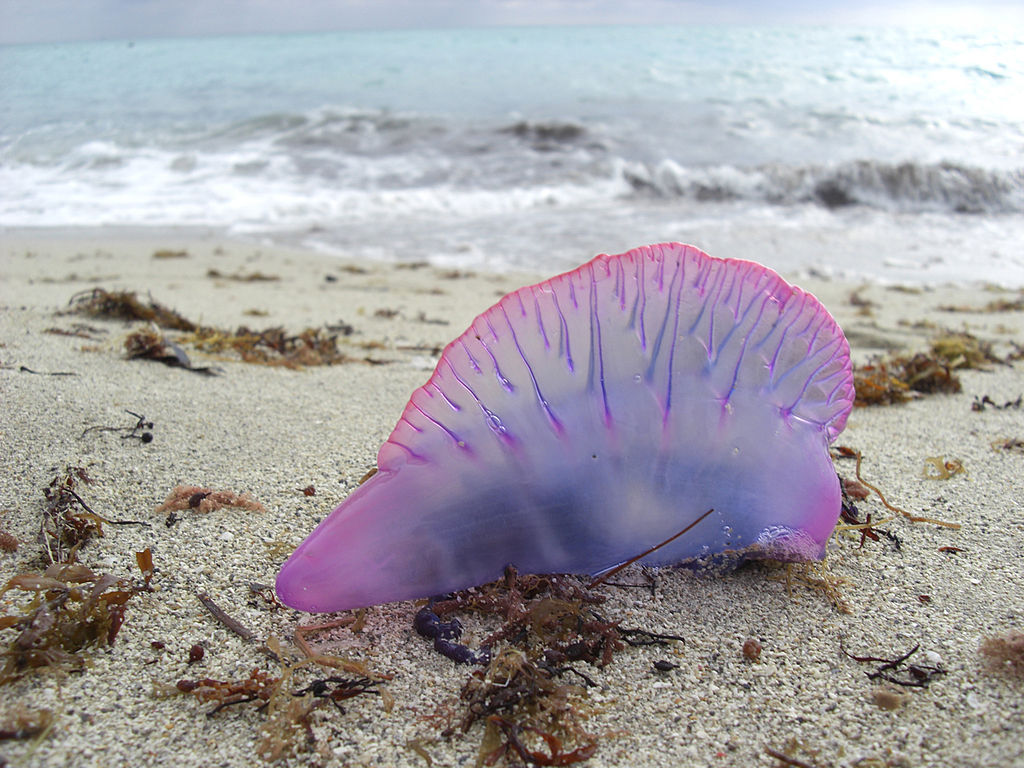 Recent sightings of Portuguese man of wars (a jellyfish like creature) on the beaches of the Jersey Shore has raised both interest and fear among beachgoers especially now with the July 4th weekend only a few days away. The good news…the NJ Poison Experts are prepared to help anyone who may have questions or has been injured by this creature. Poison center experts are encouraging the public to stay away from these creatures as much as possible. If you see any in the water, swim away from them and have a professional remove any found on the beach.
Recent sightings of Portuguese man of wars (a jellyfish like creature) on the beaches of the Jersey Shore has raised both interest and fear among beachgoers especially now with the July 4th weekend only a few days away. The good news…the NJ Poison Experts are prepared to help anyone who may have questions or has been injured by this creature. Poison center experts are encouraging the public to stay away from these creatures as much as possible. If you see any in the water, swim away from them and have a professional remove any found on the beach.
“We encourage the public to report all exposures to us at the NJ Poison Center (800-222-1222),” said Steven Marcus, MD, executive and medical director of the NJ Poison Center. “Our experts are available 24/7/365 to give advice on how to handle such exposures. Do not follow the suggestions given by friends, relatives or found on the internet. Call the poison center for help. Remember, we are just a phone call away!”
What is a Portuguese man of war? The scientific name is physalia physali. Commonly referred to as a jellyfish, it is not quite that at all. This creature is really a group of animals working together as a colony to survive in the watery environment. These creatures can be found floating in warm waters around the world. They often appear in large numbers at the same time, raising the risks of exposure for the swimmer and beachgoer alike.
Are they dangerous? Man-of-wars tend to float on the water’s surface making them a potential hazard to anyone in the water (swimmers, surfers, boogie boarders, children frolicking, pets, etc.), especially if they appear in large numbers. These jellyfish like creatures have extremely long tentacles attached to a balloon-like float. Located on their tentacles are mechanisms (nematocysts) that will deliver a painful sting if they should come in contact with human skin. Unfortunately, their tentacles tend to wrap around the victim’s body or extremities resulting in numerous “stings.” Although man-of-war stings are very painful, they rarely fatal.
Where are they? There are reports of swarms of man-of-wars occurring in many regions, including along the Jersey Shore.
What are the symptoms if stung? Man-of-wars are known to deliver very painful stings, potentially making it difficult for a swimmer to swim back to shore. Deaths have been reported from drowning.
Stings often times leave dark, colored track marks along the skin where the tentacle made contact on the body. The pain produced by the sting can become severe at times, lasting for several hours. Those injured
may also experience itching, swelling, tingling and numbness, burning or prickling sensation, nausea, vomiting, headache, fever, loss of consciousness, muscle and joint problems, difficulty breathing, heart problems, weakness and dizziness, etc. This experience is extremely painful, but rarely fatal. There may be scarring left on the skin of the affected area.
What to do if you encounter a Portuguese man-of-war? As with other stinging animals, the best way to stay safe is to avoid contact. Always be aware to the possible presence of these creatures in the water. If you should see any, stay as far away as you can or get out of the water. Remember, only the balloon-like float is seen above the water level. The stinging tentacles trail behind for a considerable distance, often over a yard or more. Since it may be difficult to tell which is the front or back, give these creatures their due respect and stay well away from them!
Keep in mind that no one should ever handle a “live” or “dead” specimen. There are many reports of stings occurring from contact with man-of-wars that have washed up onto the shoreline. Even after being on the beach for days, they retain their stinging capability. Their tentacles and the nematocysts may still release toxins even after several days of being out of the water.
If stung, wash the affected area with sea water (salt water) and then remove the tentacle(s) using a stick or other object. Do not use fresh water, vinegar, or urine since such efforts have been shown not to help and can potentially make things worse. Do not touch the tentacle(s) with your bare skin (hand, finger, etc.). If stinging occurs, it is probably best to seek medical care immediately. If the pain is severe and/or the tentacles cannot be seen/removed with ease, seek medical attention right away.
If you or a loved one should be stung by a Portuguese man-of-war or any other kind of creature, it’s good to know help is just a phone call away. Program the Poison Help number (800-222-1222) into your cell phones and contact us immediately for help. Every minute counts in poisoning situations so do not take chances by either waiting until symptoms occur or waste valuable time looking up information on the Internet. If someone is unconscious, not breathing, seizing/convulsing, bleeding profusely, difficult to arouse/wake up, etc. call 911 immediately, otherwise call us (NJ Poison Experts) at 800-222-1222.
Many of the calls the poison center gets are genuine emergencies. Having a poison expert give you exact instructions for your specific situation can help significantly during those critical first few minutes. A quick response by both the caller and the poison center expert can make a difference in preventing serious injury and saving lives.
[TLS. Photo credit: Scott Sonnenberg, Wikipedia.]


the right number for poison control is (800) 222 -1222 not 222-222 as it states one of the times in the article.
JOAT , IT SAYS IT CORRECTLY ALL THE TIMES